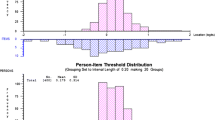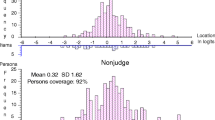Abstract
The Five Facet Mindfulness Questionnaire (FFMQ) is a 39-item instrument derived by factor analyzing the combined pool of items from five independently developed mindfulness questionnaires. It has five subscales: observing, describing, acting with awareness, nonjudging of internal experience, and nonreactivity to internal experience. The five subscales have demonstrated good internal consistency and test-retest reliability, concurrent validity, and change with mindfulness training. The FFMQ has been validated in a wide range of samples, including clinical, community, meditating, and student samples. In addition to the original 39-item version, several short forms have been developed, and the measure is available in a number of languages. Psychometric properties in other languages are generally similar to those in the original English version. Based on consistent findings demonstrating differential relationships between the observing facet and other variables and differential factor structures (with and without observing), in people with and without meditation experience, it is advisable for studies to exclude the observing subscale from total scores when comparing meditators with nonmeditators or scores before and after mindfulness interventions.
Similar content being viewed by others
References
Baer, R. A. (2003). Mindfulness training as a clinical intervention: A conceptual and empirical review. Clinical Psychology: Science and Practice, 10, 125–143.
Baer, R. A. (2011). Measuring mindfulness. Contemporary Buddhism, 12, 241–261.
Baer, R. A. (2015). Assessing mindfulness in multiple contexts: A comment on Christopher, Woodrich, & Tiernan (2015). Mindfulness, 6, 687–692.
Baer, R. A., Smith, G. T., & Allen, K. B. (2004). Assessment of mindfulness by self-report: The Kentucky Inventory of Mindfulness Skills. Assessment, 11, 191–206.
Baer, R. A., Smith, G. T., Hopkins, J., Krietemeyer, J., & Toney, L. (2006). Using self-report assessment methods to explore facets of mindfulness. Assessment, 13, 27–45.
Baer, R., Smith, G., Lykins, E., Button, D., Krietemeyer, J., Sauer, S., & Williams, JMG. (2008). Construct validity of the Five Facet Mindfulness Questionnaire in meditating and nonmeditating samples. Assessment, 115, 329–342.
Baer, R. A., Carmody, J., & Hunsinger, M. (2012). Weekly change in mindfulness and perceived stress in a mindfulness-based stress reduction program. Journal of Clinical Psychology, 68(7), 755–765.
Bohlmeijer, E., ten Klooster, P. M., Fledderus, M., Veehof, M., & Baer, R. (2011). Psychometric properties of the Five Facet Mindfulness Questionnaire in depressed adults and development of a short form. Assessment, 18, 308–320.
Brown, K. W., & Ryan, R. M. (2003). The benefits of being present: Mindfulness and its role in psychological well-being. Journal of Personality and Social Psychology, 84, 822–848.
Buchheld, N., Grossman, P., & Walach, H. (2001). Measuring mindfulness in insight meditation (Vipassana) and meditation-based psychotherapy: The development of the Freiburg Mindfulness Inventory (FMI). Journal for Meditation and Meditation Research, 1, 11–34.
Carmody, J., & Baer, R. A. (2008). Relationships between mindfulness practice and levels of mindfulness, medical and psychological symptoms and well-being in a mindfulness-based stress reduction program. Journal of Behavioral Medicine, 31(1), 23–33.
Cebolla, A., García-Palacios, A., Soler, J., Guillen, V., Baños, R., & Botella, C. (2012). Psychometric properties of the Spanish validation of the five facets of mindfulness questionnaire (FFMQ). The European Journal of Psychiatry, 26(2), 118–126.
Chadwick, P., Hember, M., Symes, J., Peters, E., Kuipers, E., & Dagnan, D. (2008). Responding mindfully to unpleasant thoughts and images: Reliability and validity of the Southampton mindfulness questionnaire (SMQ). British Journal of Clinical Psychology, 47, 451–455.
Christopher, M. S., Neuser, N. J., Michael, P. G., & Baitmangalkar, A. (2012). Exploring the psychometric properties of the Five Facet Mindfulness Questionnaire. Mindfulness, 3(2), 124–131.
Cicchetti, D. V. (1994). Guidelines, criteria, and rules of thumb for evaluating normed and standardized assessment instruments in psychology. Psychological Assessment, 6, 284–290.
Clark, L., & Watson, D. (1995). Constructing validity: Basic issues in objective scale development. Psychological Assessment, 7(3), 309–319.
Curtiss, J., & Klemanski, D. H. (2014). Factor analysis of the Five Facet Mindfulness Questionnaire in a heterogeneous clinical sample. Journal of Psychopathology and Behavioral Assessment, 36(4), 683–694.
de Bruin, E. I., Topper, M., Muskens, J., Bögels, S., & Kamphuis, J. (2012). Psychometric properties of the Five Facets Mindfulness Questionnaire (FFMQ) in a meditating and a non-meditating sample. Assessment, 19(2), 187–197.
Deng, Y.-Q., Liu, X.-H., Rodriguez, M. A., & Xia, C.-Y. (2011). The Five Facet Mindfulness Questionnaire: Psychometric properties of the Chinese version. Mindfulness, 2(2), 123–128.
Desrosiers, A., Vine, V., Curtiss, J., & Klemanski, D. H. (2014). Observing nonreactively: A conditional process model linking mindfulness facets, cognitive emotion regulation strategies, and depression and anxiety symptoms. Journal of Affective Disorders, 165, 31–37.
Dimidjian, S., & Linehan, M. M. (2003). Mindfulness practice. In W. O’Donohue, J. E. Fisher, & S. C. Hayes (Eds.), Empirically supported techniques of cognitive behavior therapy: A step-by-step guide for clinicians. Wiley.
Eisenlohr-Moul, T. A., Walsh, E. C., Charnigo, R. J., Jr., Lynam, D. R., & Baer, R. A. (2012). The “what” and the “how” of dispositional mindfulness: Using interactions among subscales of the Five-Facet Mindfulness Questionnaire to understand its relation to substance use. Assessment, 19(3), 276–286.
Feldman, G. C., Hayes, A. M., Kumar, S. M., Greeson, J. G., & Laurenceau, J. P. (2007). Mindfulness and emotion regulation: The development and initial validation of the Cognitive and Affective Mindfulness Scale–Revised (CAMS-R). Journal of Psychopathology and Behavioral Assessment, 29, 177–190.
Giovannini, C., Giromini, L., Bonalume, L., Tagini, A., Lang, M., & Amadei, G. (2014). The Italian Five Facet Mindfulness Questionnaire: A contribution to its validity and reliability. Journal of Psychopathology and Behavioral Assessment, 36(3), 415–423.
Grossman, P., Niemann, L., Schmidt, S., & Walach, H. (2004). Mindfulness-based stress reduction and health benefits: A meta-analysis. Journal of Psychosomatic Research, 57(1), 35–43.
Gu, J., Strauss, C., Bond, R., & Cavanagh, K. (2015). How do mindfulness-based cognitive therapy and mindfulness-based stress reduction improve mental health and wellbeing? A systematic review and meta-analysis of mediation studies. Clinical Psychology Review, 37, 1–12.
Gu, J., Strauss, C., Crane, C., Barnhofer, T., Karl, A., Cavanagh, K., & Kuyken, W. (2016). Examining the factor structure of the 39-item and 15-item versions of the Five Facet Mindfulness Questionnaire before and after mindfulness-based cognitive therapy for people with recurrent depression. Psychological Assessment, 28, 791–802.
Haynes, S., & Lench, H. (2003). Incremental validity of new clinical assessment measures. Psychological Assessment, 15(4), 456–466.
Heeren, A., Douilliez, C., Peschard, V., Debrauwere, L., & Philippot, P. (2011). Cross-cultural validity of the Five Facets Mindfulness Questionnaire: Adaptation and validation in a French-speaking sample. European Review of Applied Psychology/Revue Européenne de Psychologie Appliquée, 61(3), 147–151.
Heeren, A., Lannoy, S., Coussement, C., Hoebeke, Y., Verschuren, A., Blanchard, M. A., & Gierski, F. (2021). A network approach to the five-facet model of mindfulness. Scientific Reports, 11(1), 1–11.
Hou, J., Wong, S., Lo, H., Mak, W., & Ma, H. (2014). Validation of a Chinese version of the Five Facet Mindfulness Questionnaire in Hong Kong and development of a short form. Assessment, 21(3), 363–371.
Khoury, B., Lecomte, T., Fortin, G., Masse, M., Therien, P., Bouchard, V., & Hofmann, S. G. (2013). Mindfulness-based therapy: A comprehensive meta-analysis. Clinical Psychology Review, 33, 763–771.
Kornfield, J. (1993). A path with heart: A guide through the perils and promises of spiritual life. Bantam Books.
Lilja, J. L., Frodi-Lundgren, A., Hanse, J., Josefsson, T., Lundh, L.-G., Sköld, C., Hansen, E., & Broberg, A. (2011). Five Facets Mindfulness Questionnaire – Reliability and factor structure: A Swedish version. Cognitive Behaviour Therapy, 40(4), 291–303.
May, L. M., & Reinhardt, K. M. (2018). Self-other agreement in the assessment of mindfulness using the five-facet mindfulness questionnaire. Mindfulness, 9(1), 105–116.
Medvedev, O. N., Siegert, R. J., Kersten, P., & Krägeloh, C. U. (2017). Improving the precision of the Five Facet Mindfulness Questionnaire using a Rasch approach. Mindfulness, 8(4), 995–1008.
Medvedev, O. N., Titkova, E. A., Siegert, R. J., Hwang, Y.-S., & Krägeloh, C. U. (2018). Evaluating short versions of the Five Facet Mindfulness Questionnaire using Rasch analysis. Mindfulness, 9, 1411.
Medvedev, O. N., Cervin, M., Barcaccia, B., Siegert, R. J., Roemer, A., & Krägeloh, C. U. (2020). Network analysis of mindfulness facets, affect, compassion, and distress. Mindfulness, 1–12.
Michalak, J., Zarbock, G., Drews, M., Otto, D., Mertens, D., Ströhle, G., & Heidenreich, T. (2016). Erfassung von Achtsamkeit mit der deutschen version des Five Facet Mindfulness Questionnaires (FFMQ-D). Translated title: Assessment of mindfulness with the German version of the Five Facet Mindfulness Questionnaires (FFMQ-D). Zeitschrift für Gesundheitspsychologie, 24(1), 1–12.
Pang, D., & Ruch, W. (2018). Scrutinizing the components of mindfulness: Insights from current, past, and non-meditators. Mindfulness, 10, 492–505.
Segal, Z. V., Williams, J. M. G., & Teasdale, J. D. (2002). Mindfulness-based cognitive therapy for depression: A new approach to preventing relapse. Guilford.
Smith, G. T., Fischer, S., & Fister, S. M. (2003). Incremental validity principles in test construction. Psychological Assessment, 15, 467–477.
Sugiura, Y., Sato, A., Ito, Y., & Murakami, H. (2012). Development and validation of the Japanese version of the Five Facet Mindfulness Questionnaire. Mindfulness, 3, 85–94.
Tomfohr, L. M., Pung, M. A., Mills, P. J., & Edwards, K. (2015). Trait mindfulness is associated with blood pressure and interleukin-6: Exploring interactions among subscales of the Five Facet Mindfulness Questionnaire to better understand relationships between mindfulness and health. Journal of Behavioral Medicine, 38(1), 28–38.
Tran, U. S., Glück, T. M., & Nader, I. W. (2013). Investigating the Five Facet Mindfulness Questionnaire (FFMQ): Construction of a short form and evidence of a two-factor higher order structure of mindfulness. Journal of Clinical Psychology, 69, 951–965.
Truong, Q. C., Krägeloh, C. U., Siegert, R. J., Landon, J., & Medvedev, O. N. (2020). Applying generalizability theory to differentiate between trait and state in the Five Facet Mindfulness Questionnaire (FFMQ). Mindfulness, 11(4), 953–963.
Visted, E., Vøllestad, J., Nielsen, M. B., & Nielsen, G. H. (2015). The impact of group-based mindfulness training on self-reported mindfulness: A systematic review and meta-analysis. Mindfulness, 6, 501–522.
Williams, M. J., Dalgleish, T., Karl, A., & Kuyken, W. (2014). Examining the factor structures of the Five Facet Mindfulness Questionnaire and the Self-Compassion Scale. Psychological Assessment, 26(2), 407–418.
Author information
Authors and Affiliations
Corresponding author
Editor information
Editors and Affiliations
Rights and permissions
Copyright information
© 2022 Springer Nature Switzerland AG
About this entry
Cite this entry
Baer, R., Gu, J., Strauss, C. (2022). Five Facet Mindfulness Questionnaire (FFMQ). In: Medvedev, O.N., Krägeloh, C.U., Siegert, R.J., Singh, N.N. (eds) Handbook of Assessment in Mindfulness Research. Springer, Cham. https://doi.org/10.1007/978-3-030-77644-2_15-1
Download citation
DOI: https://doi.org/10.1007/978-3-030-77644-2_15-1
Received:
Accepted:
Published:
Publisher Name: Springer, Cham
Print ISBN: 978-3-030-77644-2
Online ISBN: 978-3-030-77644-2
eBook Packages: Springer Reference Behavioral Science and PsychologyReference Module Humanities and Social SciencesReference Module Business, Economics and Social Sciences




